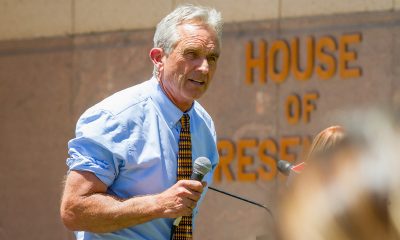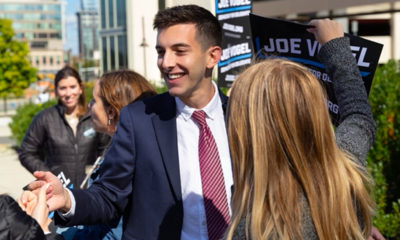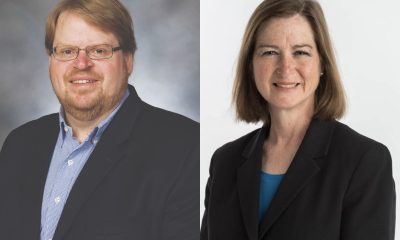Local
Clinton returns to D.C. lamenting mistakes of 2016 campaign
Dem nominee on role of misogyny, fake news in election loss
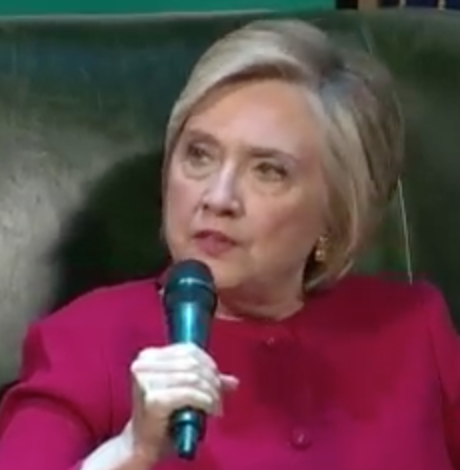
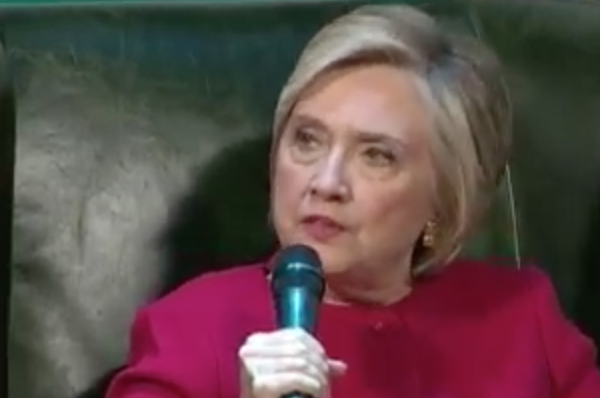
Hillary Clinton lamented having stayed “too focused on a path” in the 2016 election. (Screenshot via CSPAN)
As Hillary Clinton has reemerged in the national spotlight to promote her new book, some critics have groaned and wondered why she won’t just go away. They were not among the crowd at the Warner Theatre on Monday night.
In fact, the veneration for the first female U.S. presidential nominee of a major political party was palpable among attendees, who paid upwards of $82 for a ticket to the event.
The topic of discussion was her new book “What Happened” — a self-examination of the 2016 presidential campaign and actions that led to her loss and the election of President Trump to the White House — and Clinton had many explanations for that outcome and the way forward.
Clinton laid out a balanced approach to explain her loss, attributing the outcome not just to her missteps, but also outside forces that tipped the election in Trump’s favor.
“I just decided I was going to write it, and it was painful,” Clinton said. “I say in the book that I’d write about something, and I’d have to go lie down because it was just so hard to think about the mistakes I made and missed opportunities, but then also to come to grips with these other big forces at work that I think had a determinative impact on the outcome.”
Clinton recalled after the election before she started writing the book in February being “so devastated,” trying to feel better by cleaning out closets and taking walks in the park. The process of the writing the book, Clinton said, was “cathartic,” but also important for her view of democracy.
“It really hit me there were these very important issues that needed to be discussed, debated even, that our democracy and country relied upon that kind of self-examination,” Clinton said.
A key factor Clinton identified in her loss was not realizing the game had changed since her runs with her husband President Bill Clinton in the 1990s and her earlier campaign in 2008 — even during the 1960s and 1970s — when clear policy proposals were crucial for presidential candidates.
“You realize that the press is not putting out the policy that you’re putting out everyday, they’re covering an empty podium,” Clinton said. “And I kept thinking, ‘Well, we’re still going to break through because we really care do about what kind of jobs and infrastructure and health care and other things you want to do for them and their families and their incomes, but there’s a disconnect.”
Although Clinton said she “stayed too focused on a path” and “was not as adept” at changing to the new environment, she cautioned a less detailed approach might not be the path in the future and speculated “people will want details” again in 2020.
Lissa Muscatine, co-owner of Politics & Prose and Clinton’s chief speechwriter in the State Department and the White House, moderated the forum and queried Clinton on factors attributed to her loss, from Russian interference to fake news and misogyny.
Clinton recalled feeling compelled to exercise constraint as a woman and not respond during the second presidential debate when Trump could be seen on camera lurching close behind her as she spoke.
“As you might think back — funny gestures, facial expressions, heavy sighs — these really do affect viewers,” Clinton said. “And I just ended up believing that in addition to the gender-linked aspect of this, there was a history of people in presidential debates who had deviated in a way to show frustration, anger, dismissiveness, whatever their feelings were, and paid a heavy price for it, and I thought whatever price they paid, I would pay double or triple.”
Clinton recalled with indignation the Russians hacking the emails of her campaign chair John Podesta, which she described as being “stolen,” and given to Wikileaks — a website Clinton called “nothing more than a tool of Putin and the Kremlin.” Clinton said Trump’s associates “certainly” knew about it, citing a tweet from Roger Stone that Podesta’s time in a barrel would soon come.
Although Clinton said the emails were “anodyne,” she said they were later weaponized as fake news — in one case to potentially violent consequences as a result of the Pizzagate scandal in which Clinton was accused of running a child trafficking ring out of the basement of D.C. pizzeria. (The restaurant doesn’t even have a basement).
“Even I have to say I don’t believe it was meant to be believed to influence somebody to pick up an AR-15 and drive from North Carolina to Washington to liberate the imaginary children from the imaginary basement of the pizza parlor,” Clinton said. “But in came this young man believing that he was on a mission because he saw it on Facebook, he saw it in other places online, he saw it in quote, news outlets. And so, he was there on a mission of rescue. People could have gotten killed; he [fired] his automatic weapon inside this pizza parlor.”
Citing her loss to Trump by 53 percent among white women, Clinton said a major factor was former FBI Director James Comey reopening the email investigation — only for him to close it again one day before the election .
“All of sudden, people are told being told something’s going on, they’re going to investigate her again, or whatever,” Clinton said. “We could see that a lot of women in particular turned away. They were discouraged. I don’t blame them. They didn’t know what to believe. I mean, it was outrageous.”
When Muscatine mentioned Sen. Bernie Sanders (I-Vt.), whom Clinton heavily criticizes in her book for raising doubts about her connections to Wall Street, the audience at the Warner Theatre audibly booed and hissed.
But there were also moments of levity at the event. Muscatine at one point engaged Clinton in a game of having to choose one of a pair of words. Asked about “tea” or “coffee,” Clinton replied “coffee.” Asked about “beach” or “mountains,” Clinton replied “beach.” Asked about “Trump” or “Putin,” Clinton replied she’d have to “take that under advisement” because she “ran against both of them.”
Attendees at the event — who consisted mostly of middle-class women but also members of D.C.’s LGBT community — came to the Warner Theater adorned in Clinton campaign T-shirts leftover from the 2016 election. One vendor outside sold campaign buttons with slogans reading “Hillary 2016” and “Hil Yes!”
Blake Smith, 20, a gay student at George Washington University, worked for Clinton’s presidential campaign and came to the event wearing a T-shirt comprised of a collage of images of Clinton.
“I just think she gets a bad rap,” Smith said. “And I think that people treat her really unfairly, and I think that she’s really, genuinely a good person and she cares about this country.”
District of Columbia
Taste of Point returns at critical time for queer students
BIPOC scholar to speak at Room & Board event on May 2

The Point Foundation will kick off May with its annual Taste of Point DC event. The event will be hosted at Room & Board on 14th Street and feature a silent auction, food tastings, a speech from a scholar, and more.
Point’s chief of staff, Kevin Wright, said that at Taste of Point, the scholars are the star of the show.
“People never come to an event to hear Point staff speak, they come to hear from the people most impacted by the program,” he said. “At its core Taste of Point is designed to center and highlight our scholars’ voices and experiences.”
This year, a Point BIPOC Scholar, Katherine Guerrero Rivera will speak at the event.
“It is a great opportunity to highlight the scholars out there on the front lines making impacts in almost every sector and job field,” Wright said.
Wright pointed out that this year especially is a pivotal time for LGBTQ students.
“In 2023, there were 20 states that passed anti-LGBTQ legislation,” he said. “By this point in [2024] we already have more.”
Wright said the impacts of those legislative attacks are far reaching and that Point is continuously monitoring the impact they have on students on the ground.
Last month, The Washington Post reported that states with anti-LGBTQ laws in place saw school hate crimes quadruple. This report came a month after a non-binary student, Nex Bennedict, died after being attacked at school.
“So, we see this as a critical moment to really step up and help students who are facing these challenges on their campus,” Wright said. “Our mission is to continue to empower our scholars to achieve their full academic and leadership potential.”
This year Point awarded nearly 600 LGBTQ students with scholarships. These include the flagship scholarship, community college scholarship and the BIPOC scholarship. When the foundation started in 2002, there were only eight scholarships awarded.
Dr. Harjant Gill is one of those scholars who said the scholarship was pivotal for him. Gill said he spent his undergraduate years creating films and doing activism for the LGBTQ community.
As a result, his academic record wasn’t stellar and although he was admitted into American University’s graduate program he had no clue how he would fund it.
Upon arrival to American he was told to apply for a Point scholarship and the rest was history.
“It ended up being the one thing that kept me going otherwise I would have dropped out,” he said. “Point was incredibly instrumental in my journey to becoming an academic and a professor.”
More than a decade later, Gill serves on the host committee for Taste of Point and is a mentor to young Point scholars. He said that he donates money yearly to Point and that when he is asked what he wants for a gift he will often tell his friends to donate too.
To attend the event on Wednesday, May 2, purchase tickets at the Point website. If you can’t attend this year’s Taste of Point DC event but would like to get involved, you can also donate online.
District of Columbia
Three of five LGBTQ candidates win race for DNC delegate from D.C.
32 candidates competed for 13 elected seats in party caucus
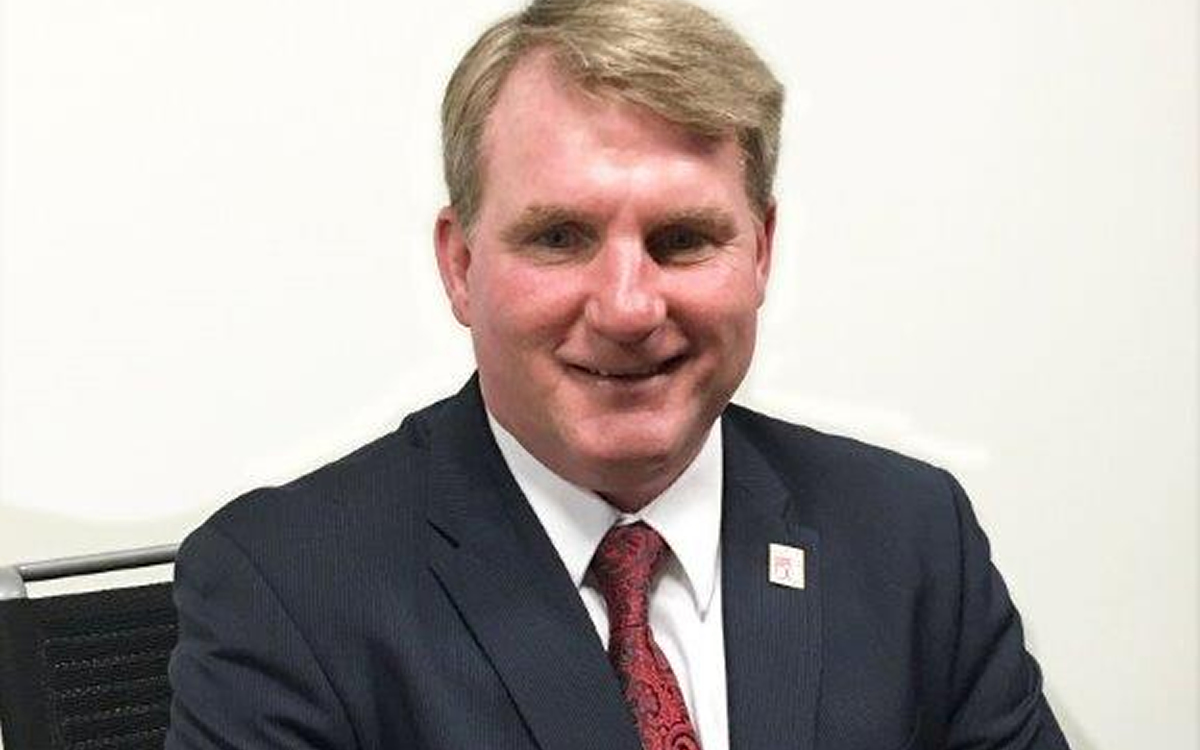
Three out of five known LGBTQ candidates running for election as delegates from D.C. to the Democratic National Convention won their races at an April 20 Democratic Party caucus election held at D.C.’s Walter Washington Convention Center.
Ward 2 gay Democratic activist John Fanning finished in first place with 140 votes and Ward 8 gay Democratic activist David Meadows finished in second place with 127 votes in a race in which six male candidates committed to supporting President Biden were competing for three male seats in a section of the city designated as Congressional District 1, which included registered Democratic voters in Wards 1, 2, 6, and 8.
Ward 7 gay Democratic activist Jimmie Williams won his race, finishing in third place with 200 votes in a race in which eight male candidates committed to President Biden competed for four male seats in the Congressional District 2 section of the city that included Wards 3, 4, 5, and 7.
Gay Democratic activist Felipe Afanador lost his race, finishing in sixth place with 47 votes in the Congressional District 2 election for male candidates backing Biden. It couldn’t immediately be determined which of the four wards in District 2 he is from.
The Washington Blade didn’t learn about Afanador’s status as an LGBTQ candidate until the Capital Stonewall Democrats announced it one day before the April 20 party election in an email statement.
In the Congressional District 2 race among female candidates, in which eight candidates competed for three female seats, transgender rights advocate and Ward 3 Democratic Party activist Monika Nemeth lost her race, finishing in sixth place with 49 votes.
The five LGBTQ candidates were among 32 candidates competing for just 13 elected delegate positions in D.C. D.C. will have a total of 51 delegates to the Democratic Convention, but the other 38 include elected officials and party leaders who are considered “automatic” or appointed delegates. The Democratic Convention will be held in Chicago Aug. 19-23.
Observers familiar with the April 20 party caucus election said Fanning, Meadows, and Williams had participated in local D.C. Democratic Party events and activities for a longer period than Nemeth and Afanador and appear to have been better known among Democratic voters in their respective wards as well as other wards. Those factors contributed to their receiving significantly more votes than most other candidates, observers have said.
In his candidacy statement posted on the D.C. Democratic Party website, Afanador said he worked on the 2020 Biden presidential election campaign in Pennsylvania. His LinkedIn page says in 2022 he began work in Washington for the Biden administration as an official in the U.S. Department of Agriculture.
Nemeth is a past president of D.C.’s Capital Stonewall Democrats, the city’s largest LGBTQ local political group, and has been an active member of the D.C. Democratic State Committee, the local party governing body. She served as a Biden delegate at the 2020 Democratic National Convention.
“It is important for our D.C. delegation to have strong LGBTQ representation,” Capital Stonewall Democrats said in its April 19 statement. “There are five LGBQ candidates running to be delegate, and Capital Stonewall Democrats asks that our members support each one,” the statement says.
“Unfortunately, they fell short, but they and all queer Democrats are welcome to attend and participate in convention events and activities sponsored by the national and local party,” Meadows told the Blade in referring to Nemeth and Afanador. “Our shared goal is to unite behind the Biden-Harris ticket to protect our LGBTQ rights from being dismantled by Donald Trump and the GOP,” Meadows said.
“Running for District Delegate is one of the most grassroots efforts,” Fanning told the Blade. “It’s very beneficial to align yourself on a slate with community leaders that have either previously run for District Delegate or have developed a constituency in their community from other civic engagements,” he said, referring to possible reasons for his, Meadows, and Williams’s election victory.
Aside from the D.C. elected LGBTQ delegates, two prominent D.C. LGBTQ Democratic leaders will be appointed as delegates to the 2024 Democratic National Convention in their role as members of the Democratic National Committee from D.C. They are Claire Lucas, a highly acclaimed Democratic Party and LGBTQ rights advocate and party fundraiser; and Earl Fowlkes, one of the lead organizers of D.C.’s annual Black LGBTQ Pride celebration and former president of the Capital Stonewall Democrats. Both are committed to supporting President Biden as the Democratic nominee for re-election.
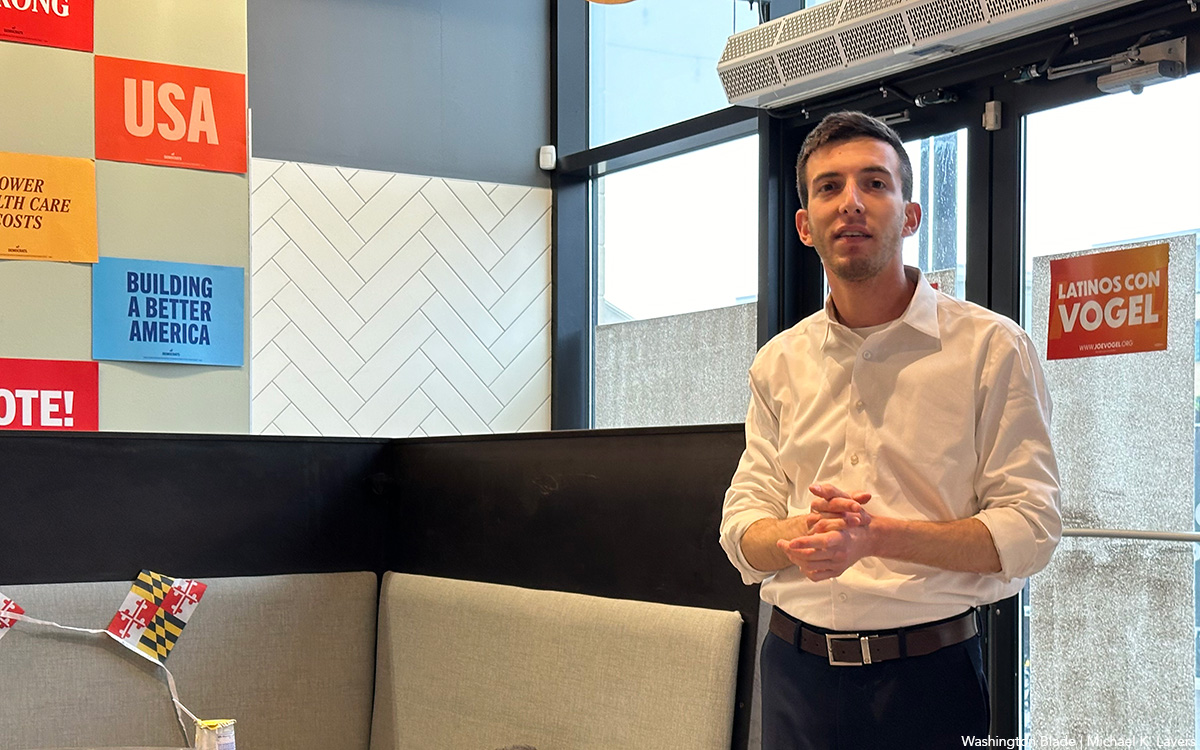
GAITHERSBURG, Md. — Maryland state Del. Joe Vogel (D-Montgomery County) on Friday held a “Big Gay Canvass Kickoff” event at his congressional campaign’s headquarters.
LGBTQ+ Victory Fund Vice President of Outreach and Engagement Marty Rouse and John Klenert, a member of the DC Vote and Victory Fund Campaign board of directors, are among those who participated alongside members of Equality PAC. Vogel spoke before Rouse, Klenert and others canvassed for votes in the area.
“Joe brings a fresh new perspective to politics,” said Gabri Kurtzer-Ellenbogen, deputy field director for Vogel’s campaign.
Vogel, 27, is among the Democrats running for Congressman David Trone’s seat.
Trone last May announced his bid to succeed retiring U.S. Sen. Ben Cardin (D-Md.) in the U.S. Senate.
The Democratic primary is on May 14. Vogel would be the first Latino, the first gay man and first Gen Zer elected to Congress from Maryland if he were to win in November.
“We need a new generation of leadership with new perspectives, new ideas, and the courage to actually deliver for our communities if we want things to get better in this country,” Vogel told the Washington Blade last month during an interview in D.C.
-

 South America3 days ago
South America3 days agoDaniel Zamudio murderer’s parole request denied
-

 Maryland4 days ago
Maryland4 days agoMontgomery County police chief discusses arrest of trans student charged with planned school shooting
-

 Commentary5 days ago
Commentary5 days agoWorld ‘isn’t much different today’
-

 Theater3 days ago
Theater3 days ago‘Amm(i)gone’ explores family, queerness, and faith

